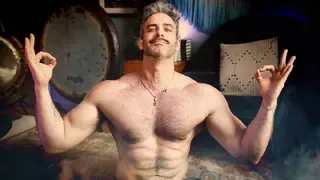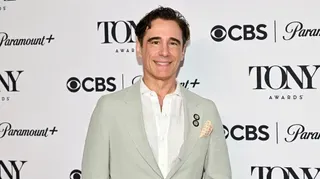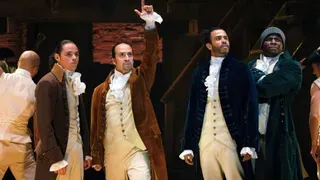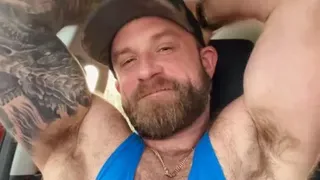August 3, 2012
'The Invisible War' exposes military sex abuse
Chris Sosa READ TIME: 11 MIN.
Out documentary filmmaker Kirby Dick never shirks from controversial subjects, be it the movie rating system ("This Film Is Not Rated"), sexual abuse by priests (the Oscar nominated "Twist of Faith") or closeted gay Republicans ("Outrage").
His latest - "The Invisible War" is no exception. An explosive look at the rape epidemic in the US military, his critically acclaimed film (in limited release) chronicles the stories of numerous service members as they seek justice for the crimes committed against them during their enlistment.
Interwoven throughout their personal stories is the unshakably documented and damning narrative of how the military has covered up this crisis and shunned survivors. The award-winning director discussed the making of the film, public response, and his hopes for the military's future with EDGE.
Huge scope
EDGE: What first alerted you to the epidemic of rape in the US military?
Kirby Dick: An article in Salon written by Helen Benedict.
EDGE: In researching the film, were you surprised by the sheer scope of sexual abuse you uncovered?
Kirby Dick: Completely surprised. This is an epidemic that has been covered up for decades. According to the DOD's own estimates, more 19,000 women and men were sexually assaulted last year.
So over the last several decades, hundreds of thousands of men and women have been assaulted. And going back to WWII, the number could approach a million.
EDGE: How long had you been working on this project prior to its release?
Kirby Dick: We worked on it for just under two years before we screened the film at the Sundance Film Festival, where it won the Audience Award.
Subjects forthcoming?
EDGE: Did you realize so many people would be forthcoming on camera with their deeply personal stories?
Kirby Dick: It was quite difficult to find survivors at first. Most had very severe PTSD symptoms, were agoraphobic, and were afraid to speak because when they reported their assault, the military turned on them.
But over a year and a half, we contacted more than 100 survivors. All said they wanted to participate so that the film could help stop the assaults that are going on in the military right now.
EDGE: Was it difficult to find distribution for 'The Invisible War' given the explosive content it contained about an essentially untouchable institution?
Kirby Dick: Not especially difficult. The film was very well received critically and by audiences at Sundance.
EDGE: You obtained access to military officials who spoke rather candidly on camera, especially regarding the ineffective abuse prevention programs. Were they aware the interviews were for a Kirby Dick film?
Kirby Dick: I've often asked myself that question. In a misguided way, I think they were proud of what they were doing, and seemed unaware of how ineffectual their efforts really were.
Policy changes
EDGE: Were there any efforts made to suppress the film?
Kirby Dick: No. We expected significant blowback from the military, because that is always how they reacted in the past to any reporting on this issue.
But we instituted a behind the scenes private screening campaign for policy makers at the highest levels of Congress, the Pentagon and for other influencers. And I think the film made a great impact on those policy makers.
EDGE: Secretary of Defense Leon Panetta viewed a screening of 'The Invisible War' and changed policy based on its claims. Were you surprised that such sudden action was taken in response to it?
Kirby Dick: I would say the film made of very strong impact on Panetta, and we were told it was part of the reason he called the press conference to announce those changes. But I didn't think we'd see this kind of significant response for several years.
These changes are only the first step. The military has a long way to go to successfully tackling this problem. They can do it, but they haven't yet.
EDGE: Are there any updates on legal action/s currently underway regarding military sexual abuse?
Kirby Dick: Susan Burke, the attorney representing plaintiffs who are survivors of military sexual assault, has filed several more suits. Her hope is that one of them eventually makes it to the Supreme Court. And I think there is some chance of that happening. But of course that would take years.
EDGE: Now that 'The Invisible War' is in theaters, what do you want to see from the film going forward?
Kirby Dick: Just continuing to do what it's done so far: to educate the public and push policy makers to insitute the changes that need to be made so that another film doesn't have to be produced on the subject a decade from now.
A survivor’s story
Trina McDonald is a survivor of military sexual assault and allowed her story to be told in Kirby Dick's acclaimed documentary 'The Invisible War.' McDonald was drugged, raped, and left with no way to report the crimes because her superiors were complicit in the assaults. She now lives with her wife and stepchildren, and is using her voice to speak out for change in the US military. McDonald discussed her story with EDGE, along with her hopes for future action.
EDGE: In 'The Invisible War,' you recounted being drugged and raped repeatedly in the US military with no ability to report these crimes because your superiors were perpetrators. What made you decide to go public with your story?
Trina McDonald: After years of silence and the agony of my "secret," I could no longer absorb the pain. I decided to help myself I had to find my voice and speak of my past, present and future of living with the PTSD caused by my sexual assaults. I believed in coming forward, my speaking out would benefit me tremendously, and hopefully inspire others to not keep their secrets any longer!
EDGE: The film describes sexual abuse in the military as especially traumatic given the breach of a familial style of trust fostered by the environment. Did you find this to be true for you?
Trina McDonald: Yes, I found this to be very true! Our fellow service members are our family. We'd lay down our lives to protect them, and to be betrayed in such a violent way cuts to your core. My perpetrators were my friends, used loosely. We shared so much. But it was all destroyed with one violent action. And without any recourse I was lost. It's taken years to trust anyone enough to call anyone "friend" and definitely to call them "my family."
Post traumatic stress
EDGE: Given the only recent change in military policy toward LGBT equality, how did being an LGBT individual impact your situation?
Trina McDonald: me, since I'm no longer active, it was more of a celebration for those that were still serving. Although I've always believed that I was targeted due to my sexuality, based on the fact that during my assaults, I was being investigated for being gay and not because of what was happening to me.
I do believe it will open a door for people to be stronger while serving and stop them from having to hide who they are. They'll be able to openly serve their country.
EDGE: PTSD rates for those raped in the military are more severe than comparable rates for individuals who experience combat. Tell us about the way PTSD has affected you and your family.
Trina McDonald: My wife would tell you it's been extremely difficult because of my symptoms. Our children would share how difficult it can be having to stay on edge because of my depressions or startled responses. And I would tell you this is the first time I've felt safe in a relationship.
My wife and children have seen me cry more than I could say, I could write a book on "I'm Sorry," but mostly it's been such an ongoing battle to try and remain "normal" when I often feel like a burden to my family due to my PTSD.
We work diligently on life as normal, but my PTSD is often an elephant in the room. Although its better than years ago, my anniversary times of the year can be hell dealing with intrusive suicidal ideations, nightmares of the rape, and flashbacks. We just use safe words for uncomfortable conversations to help get through the rough spots.
Coping and recovery
EDGE: What has been the most difficult struggle in the process of coping and recovering from such trauma?
Trina McDonald: The most difficult part has been hurting others due to my symptoms. I've lost relationships, been homeless and struggled with addiction. Although I'm nearly 13 years sober today, my heart often breaks at why or how someone could hurt another person as those in my unit did. I certainly wish I could just turn it off, but unfortunately PTSD and rape don't go away. It just gets different over time.
EDGE: Secretary of Defense Leon Panetta changed military policy regarding the handling of sexual abuse trials after viewing this film. Are you surprised by how quickly it's made an impact?
Trina McDonald: Yes! Although it was a quick response, I feel as though it was made in haste with the same rhetoric as years past. Not to sound hasty, but there is much more that could have been done to really impact the military policy.
EDGE: What do you hope 'The Invisible War' goes on to accomplish?
Trina McDonald: Social change! I truly hope the film opens the eyes of society as a whole, so that they can understand there are numerous wars being fought. And this is one we are losing terribly! I also hope that the military understands and acts on the urgency of the content in this film by redirecting its policy making on the issue to an outside entity.
EDGE: A final question: What do you want to say to other survivors of military sexual abuse who may be unsure of how to go forward?
Trina McDonald: Don't give up! Don't let your experience define who you are or who you are to become. Look inside and find strength in your voice to speak, knowing you are not alone. If we stand together, we will find the service members we longed to serve with in one another.
"The Invisible War" is in limited release. To find out more about the film, visit .
Watch the trailer to "The Invisible War":







